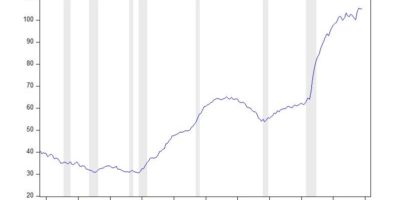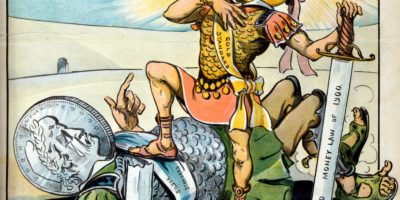Economic Education Bulletin Vol. XXXV, no. 4 | April, 1995 by Richard Salsman
READ MORE
Ongoing federal budget deficits have required the U.S. Treasury to issue substantial amounts of debt to finance government spending. The Treasury has been able to easily issue debt since the federal government enjoys the highest credit rating, which lowers the interest rate that creditors demand. Historically low interest rates in general have further helped limit interest expense.
READ MORE
In 1900, President William McKinley signed the Gold Standard Act, explicitly making gold the only commodity exchangeable for U.S. paper money.
READ MOREOn May 24 the U.S. Court of Appeals for the District of Columbia Circuit will hear oral arguments on whether the Consumer Financial Protection Bureau (CFPB) is unconstitutional. The CFPB was created under the 2010 Dodd-Frank Wall Street Reform and Consumer Protection Act, which passed in the wake of the 2008 Great Recession. The en banc court review of the CFPB, which follows a previous ruling that the bureau is unconstitutional, is a response to a claim it, unlike other regulatory agencies, is unaccountable to both presidential authority and Congress’s appropriations power. Its single director, who has a five-year term, cannot be removed by the president except “for inefficiency, neglect of duty, or malfeasance in office,” and it is funded not by Congress but by the Federal Reserve, which has no oversight power.
READ MOREPresident Trump’s first budget proposal would zero out funding for the national endowments for the arts and humanities (NEA and NEH), the Corporation for Public Broadcasting (CPB), and the Institute of Museum and Library Services (IMLS). From the outcry you’d think the abolition of these agencies as government entities, whose combined 2016 appropriations totaled $971 million out of a nearly $4 trillion national budget (roughly 0.0003 percent), would leave America a cultural wasteland. We know this can’t be true, however, because America was the furthest thing from a cultural wasteland before the national government became subsidizing cultural activities. But historical memory is short, so it’s worth reminding ourselves that jazz, the blues, rock and roll, and modern dance, theater, and literature all flourished without the government’s help. Indeed, we have reason to think that no government bureaucracy would have appropriated money to these edge art forms when they first came on the scene.
READ MOREIn 2007, at the initiative of Chairman Ben Bernanke and New York Federal Reserve Bank President Timothy Geithner, the Federal Reserve System began a set of unprecedented credit allocation policies that have been wasteful, morally hazardous, studded with favoritism, and in some cases of dubious legality.
READ MOREThose who dream of a world with greater economic freedom have traditionally relied on the pen, the ballot box, and sometimes the sword to effect change. But a relatively new technology called blockchain may make the computer a potent tool to achieve greater liberty.
READ MOREWe have written recently at AIER about how blockchain – and bitcoin, the cryptocurrency that is one early and prominent application of blockchain technology – may be important to the future of money and exchange. In this article, I discuss how in the past few years, the center of gravity of the bitcoin world moved to China and the lessons we can draw from the resulting cycle of consolidation and regulation. This may have important implications for the future of bitcoin, as well as a being a potential challenge to the decentralization that is part of the fundamental appeal of cryptocurrencies.
READ MOREAIER’s monthly Everyday Price Index was unchanged in February because an increase in prices at grocery stores and restaurants was offset by a decline in gasoline prices. The EPI measures price changes that people see in everyday purchases such as groce …
READ MOREThe U.S. economy continues to expand at a solid pace. The AIER Business-Cycle Conditions indexes all posted results well above the neutral 50 level in the latest month, February. Our Leaders registered 75 for the third consecutive month (Chart 1). Amon …
READ MORENew technologies that bring major changes to society rarely do so in ways that are straightforward or easy to predict. In a previous article, we described the basics of blockchain technology and how it could enhance and safeguard fundamental economic rights. Viewing adoption of this technology as an inevitable force that will protect civil liberties and reduce government dominance over legal and economic affairs is therefore tempting.
READ MOREIn a recent blog post on Alt-M, an alternative money website, Lawrence H. White, a senior fellow at the Cato Institute and professor of economics at George Mason University, discussed how two groups—Baptists and bootleggers—have largely become one and the same. He referred to the two types of groups that tend to spearhead prohibitions, the former on ethical grounds, and the latter with the goal of eliminating legal competition. In the blog post, the prohibition he is concerned about is on the use of cash.
READ MORE250 Division Street | PO Box 1000
Great Barrington, MA 01230-1000
Press and other media outlets contact
888-528-1216
press@aier.org
This work is licensed under a
Creative Commons Attribution 4.0 International License,
except where copyright is otherwise reserved.
© 2021 American Institute for Economic Research
Privacy Policy
AIER is a 501(c)(3) Nonprofit
registered in the US under EIN: 04-2121305